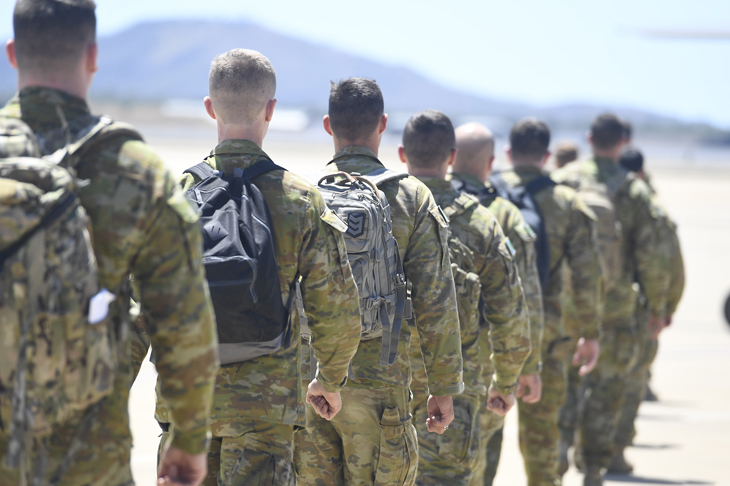Sadly, it looks as if the allegation that Australian troops committed war crimes in Afghanistan is true. In fact, here at the Armed Forces Public Relations and Stakeholder Consensus Unit, we were so disgusted by this revelation that we commissioned a joint inquiry with the ABC investigations unit, the old Fairfax newspapers and that rigorously intellectual journal Crikey.com! to make sure that it never happens again. And we are thrilled to announce today that every recommendation in our report has been accepted for inclusion in the new Defence Beige Paper. We say ‘beige’ advisedly, because the first step in rooting out crimes against humanity, erasing the dark stain on our defence escutcheon and giving our forces the more humane posture they obviously need, must be to abolish the cringingly archaic White Paper with its colonial and racist overtones, the inspiration it derived from white supremacists like Cecil Rhodes and its glorification of military disasters like the Fall of Singapore. In its place will be the more nuanced, inclusive and compassionate Beige Paper which will herald a new dawn in defence policy and planning.
Our second step was to conduct a survey of members of the three services to get an understanding of how they see the role of the armed forces and its relationship with their calmer, inner selves. The result was a profound disappointment, as it quickly became apparent that some of our people were completely out of touch with the role of the modern army. We actually discovered some who were so stuck in the past that they thought the purpose of the army was to go into battle and kill people. Naturally, as soon as we discovered that this misguided attitude was still held in the ranks, albeit by a small number of misfits, we allowed them to retire. Moreover, we have set about eradicating this aggressive attitude so that before killing anyone, our consultants (as we will shortly be reclassifying our soldiers) will have to inquire into the socio-economic background of the so-called enemy before rushing into any conclusions about the root causes of their demeanour. Highly trained defence psychologists have told us that throwing hand grenades while screaming blood-curding war cries may actually be a cry for help and that the army should respond accordingly, not in the militaristic manner that has taken hold in some of the ranks.
The next step, assuming we find enemies to capture, because we will certainly not be killing anyone without a signed form of consent, certified by two lawyers and a panel of social workers and community outreach workers, is to set up a focus group to see what has made the ‘enemy’ so angry. So far, we have found, building on our struggles in Vietnam and Afghanistan, that their apparent aggression comes from being brought up in a heteroerotic paternalistic and post-colonial society where dominant men continue to suppress the nonbinary influences at work in us all and prevent more loving and inclusive teamwork.
Thus, we are doing away with the old military hierarchy which keeps this rigid class system in place. We have long been troubled with titles like Chief of the General Staff. The very use of the words ‘chief’ and ‘general’ invokes a nasty mixture of the notions of the male head of the tribe with all of its redolent echoes of suppression of the American Indians and assertive ableism and masculinity. The idea that the ‘chief’ should have a staff, and such a thrusting male supremacist symbol at that, only makes it worse.
Then there is the music. When the Navy recently launched HMAS Supply, we had a choice between colonial and imperial relics like Colonel Bogey’s March or the theme from Zulu, and a medley from the 101 Doll Squadron. Naturally, we went for the latter, especially when their leader described them as a ‘squadron of dancehall women facilitating a movement to unite and collaborate’. After all, that is the role we see for the modern defence force: unity and collaboration. And inclusiveness. And diversity. And sustainability. Moreover, instead of the unfortunately named war games with our former allies, we will be instituting the Dreamtime Manoeuvres, with specially designed uniforms with dots and snakes, autumn tonings, vibrant spring flourishes, rugged summer boldness and, particularly, an embossed welcome-to-country patch. For ‘welcome’ will now be our message to all those we formerly saw as enemies. And our occasional morning teas with rainbow napkins and funny hats to celebrate the national day of apology to all oppressed minorities will become a daily event. In fact, noting that Napoleon so wisely observed that an army marches on its stomach, the food itself is being improved and brought more into line with the zeitgeist of the era. A typical bivouac meal in the jungle for instance will now be: thinly sliced wagyu beef, a kale salad à la Polyanna with just a hint of turmeric, an artisan brioche and designer mineral water.
But, let us face it, despite our progress, there is always the danger of relapsing back into the old war crimes mindset. Therefore, our response to those we would have previously seen as enemies will always be, in those immortal words of the Premier of Victoria: ‘We see you. We hear you. We believe you.’ This will be backed by the new SAS banner: ‘We stand for Consensus’. And we are doing away with those hackneyed cries of ‘Medic!’ and ‘Air strike!’ From now on, the only war cries on the battlefield from our side will be: ‘Lawyer!’, ‘Empathy Counsellor!’ So, we are on the right track. We have sold the port of Darwin to China as a peace offering and next to it will be our new national defensive radar and broadcast facility. It will broadcast a simple message 24 hours a day, but one that leaves our position in no doubt: ‘We surrender.’
Got something to add? Join the discussion and comment below.
Get 10 issues for just $10
Subscribe to The Spectator Australia today for the next 10 magazine issues, plus full online access, for just $10.
You might disagree with half of it, but you’ll enjoy reading all of it. Try your first month for free, then just $2 a week for the remainder of your first year.















Comments
Don't miss out
Join the conversation with other Spectator Australia readers. Subscribe to leave a comment.
SUBSCRIBEAlready a subscriber? Log in